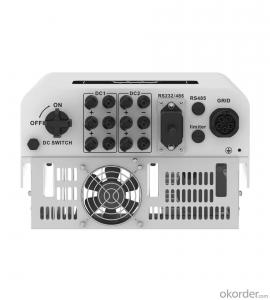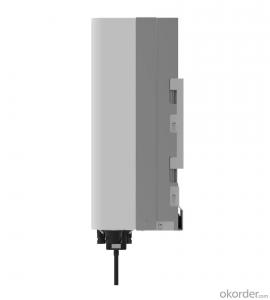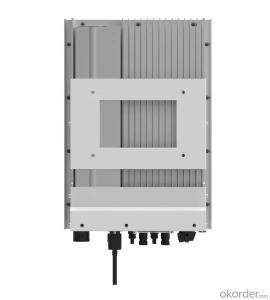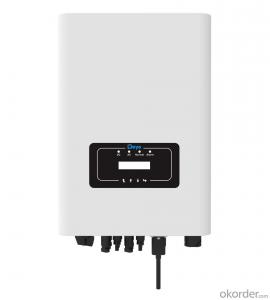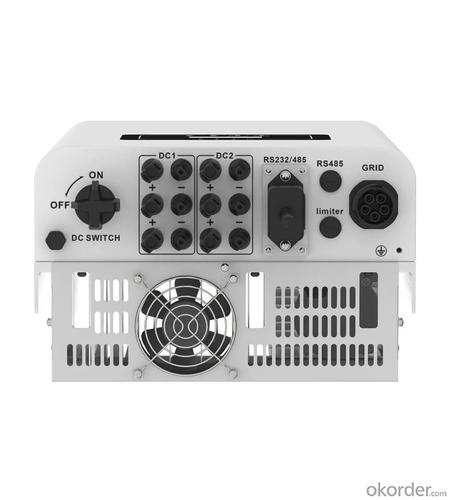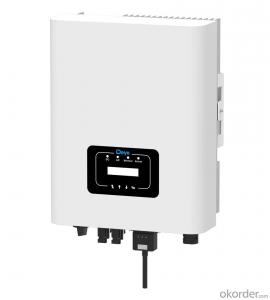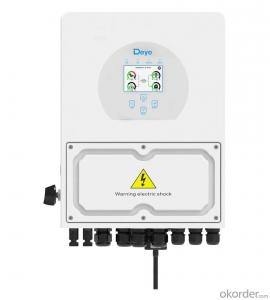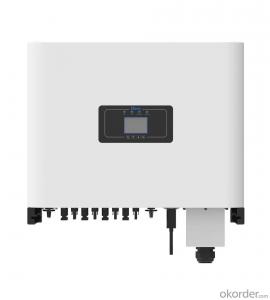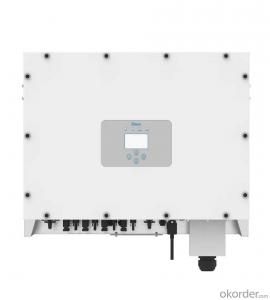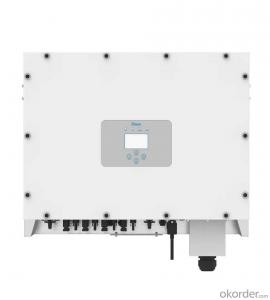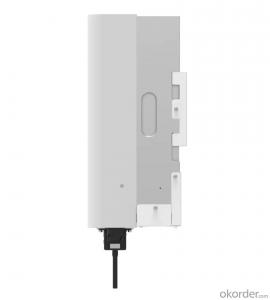3500 Watt Solar Inverter - Sun-10/12/15k-G03-LV | 10-15kW | Three Phase | 2 MPPT | Low Voltage | 127/220VAC
- Loading Port:
- Ningbo
- Payment Terms:
- TT OR LC
- Min Order Qty:
- 100 pc
- Supply Capability:
- 5000 pc/month
OKorder Service Pledge
OKorder Financial Service
You Might Also Like
Specification
| Technical Data | |||||
| Model | SUN-10K-G03-LV | SUN-12K-G02-LV | SUN-15K-G02-LV | ||
| Input Side | |||||
| Max. DC Input Power (kW) | 13 | 15.6 | 19.5 | ||
| Max. DC Input Voltage (V) | 800 | ||||
| Start-up DC Input Voltage (V) | 250 | ||||
| MPPT Operating Range (V) | 200~700 | ||||
| Max. DC Input Current (A) | 32+32 | ||||
| Max. Short Circuit Current (A) | 48+48 | ||||
| Number of MPPT / Strings per MPPT | 2/2 | ||||
| Output Side | |||||
| Rated Output Power (kW) | 10 | 12 | 15 | ||
| Max. Active Power (kW) | 11 | 13.2 | 16.5 | ||
| Nominal Output Voltage / Range (V) | 3L/N/PE 127/0.85Un-1.1Un,220 /0.85Un-1.1Un (this may vary with grid standards) | ||||
| Rated Grid Frequency (Hz) | 60 / 50 (Optional) | ||||
| Operating Phase | Three phase | ||||
| Rated AC Grid Output Current (A) | 26.2 | 31.5 | 39.4 | ||
| Max. AC Output Current (A) | 28.9 | 34.6 | 43.3 | ||
| Output Power Factor | 0.8 leading to 0.8 lagging | ||||
| Grid Current THD | <3% | ||||
| DC Injection Current (mA) | <0.5% | ||||
| Grid Frequency Range | 57~62 | ||||
| Efficiency | |||||
| Max. Efficiency | 98.6% | ||||
| Euro Efficiency | 98% | ||||
| MPPT Efficiency | >99% | ||||
| Protection | |||||
| DC Reverse-Polarity Protection | Yes | ||||
| AC Short Circuit Protection | Yes | ||||
| AC Output Overcurrent Protection | Yes | ||||
| Output Overvoltage Protection | Yes | ||||
| Insulation Resistance Protection | Yes | ||||
| Ground Fault Monitoring | Yes | ||||
| Anti-islanding Protection | Yes | ||||
| Temperature Protection | Yes | ||||
| Integrated DC Switch | Yes | ||||
| Remote software upload | Yes | ||||
| Remote change of operating parameters | Yes | ||||
| Surge protection | DC Type II / AC Type II | ||||
| General Data | |||||
| Size (mm) | 330W×508H×206D | ||||
| Weight (kg) | 20.8 | ||||
| Topology | Transformerless | ||||
| Internal Consumption | <1W (Night) | ||||
| Running Temperature | -25~65℃, >45℃ derating | ||||
| Ingress Protection | IP65 | ||||
| Noise Emission (Typical) | <45 dB | ||||
| Cooling Concept | Smart cooling | ||||
| Max. Operating Altitude Without Derating | 2000m | ||||
| Warranty | 5 years | ||||
| Grid Connection Standard | CEI 0-21, VDE-AR-N 4105, NRS 097, IEC 62116, IEC 61727, G99, G98, VDE 0126-1-1, RD 1699, C10-11 | ||||
| Operating Surroundings Humidity | 0-100% | ||||
| Safety EMC / Standard | IEC/EN 61000-6-1/2/3/4, IEC/EN 62109-1, IEC/EN 62109-2 | ||||
| Features | |||||
| DC Connection AC Connection Display Interface | MC-4 mateable | ||||
| AC Connection | IP65 rated plug | ||||
| Display | LCD1602 | ||||
| Interface | RS485/RS232/Wifi/LAN | ||||
27/220Vac and 60Hz, three phase system
2 MPP tracker, Max. efficiency up to 98.6%
Zero export application, VSG application
String intelligent monitoring (optional)
Wide output voltage range
Anti-PID function (Optional)
This series inverter is specially designed for 127/220Vac three-phase system, especially suits for South American areas. With compactness design, easy to install and operate. It supports wide AC output voltage to adapt to poor grid, extending the inverter working hours.
- Q: Can a solar inverter be used with a solar-powered educational system?
- Yes, a solar inverter can be used with a solar-powered educational system. A solar inverter is responsible for converting the direct current (DC) produced by solar panels into alternating current (AC) that can be used to power electrical devices. In the case of a solar-powered educational system, the solar inverter plays a crucial role in converting the DC energy generated by the solar panels to AC energy that can be utilized by the educational equipment, such as computers, projectors, or other electrical devices, thereby enabling the system to function efficiently.
- Q: Can a solar inverter be controlled remotely?
- Yes, a solar inverter can be controlled remotely. Many modern solar inverters come equipped with built-in communication capabilities, such as Wi-Fi or Ethernet connectivity, allowing for remote monitoring and control. Through a web-based interface or dedicated mobile app, users can access and manage their solar inverters from anywhere with an internet connection. Remote control features typically include monitoring the system's performance, adjusting settings, and troubleshooting issues. This remote control functionality offers convenience and flexibility for solar system owners, enabling them to optimize energy production and manage their system efficiently.
- Q: What is the purpose of a solar inverter?
- The purpose of a solar inverter is to convert the direct current (DC) electricity produced by solar panels into alternating current (AC) electricity that can be used to power household appliances and be fed back into the electrical grid.
- Q: What is the role of a power limiter in a solar inverter?
- The role of a power limiter in a solar inverter is to regulate and limit the amount of power that is fed into the electrical grid. It helps ensure that the solar system does not exceed the maximum power capacity of the grid, preventing any potential damage or overloading. The power limiter also helps maintain a stable and balanced power output, optimizing the efficiency and performance of the solar inverter.
- Q: Can a solar inverter be used in commercial applications?
- Yes, a solar inverter can be used in commercial applications. In fact, solar inverters are commonly used in commercial settings to convert the direct current (DC) produced by solar panels into alternating current (AC) that can be used to power various electrical devices and appliances. Commercial buildings often have larger solar systems installed, requiring more powerful inverters to efficiently convert the solar energy into usable electricity for the facility's commercial operations.
- Q: What is the lifespan of a solar inverter?
- The lifespan of a solar inverter typically ranges from 10 to 15 years, depending on various factors such as the quality of the inverter, proper maintenance, and operating conditions.
- Q: How does the quality of the AC waveform affect the performance of a solar inverter?
- The quality of the AC waveform directly affects the performance of a solar inverter. A clean and stable waveform is essential for efficient and reliable operation of the inverter. Any deviations, distortions, or harmonics in the waveform can lead to increased power losses, reduced conversion efficiency, and potential damage to the inverter. Therefore, a high-quality AC waveform is crucial for optimal performance and maximum power output from a solar inverter.
- Q: Can a solar inverter be used with a solar-powered water heating system?
- Yes, a solar inverter can be used with a solar-powered water heating system. The solar inverter converts the direct current (DC) generated by the solar panels into alternating current (AC) that can be used to power the water heating system. This allows for efficient utilization of solar energy and ensures the water heating system operates effectively.
- Q: Can a solar inverter be used with a solar-powered remote sensing system?
- Yes, a solar inverter can be used with a solar-powered remote sensing system. The solar inverter is responsible for converting the direct current (DC) generated by the solar panels into alternating current (AC) that can be used to power the remote sensing system. This allows for the efficient and reliable operation of the remote sensing system using solar energy as the primary power source.
- Q: Can a solar inverter be used with different types of grounding materials?
- Indeed, various grounding materials can be employed in conjunction with a solar inverter. Nevertheless, it is crucial to verify that the grounding system aligns with the manufacturer's prescribed specifications and guidelines for the specific solar inverter. The selected grounding materials must adhere to the essential safety standards and furnish adequate electrical grounding for the solar setup. It is advisable to seek guidance from a certified electrician or solar expert to ascertain the fitting grounding materials for your particular solar inverter and installation.
Send your message to us
3500 Watt Solar Inverter - Sun-10/12/15k-G03-LV | 10-15kW | Three Phase | 2 MPPT | Low Voltage | 127/220VAC
- Loading Port:
- Ningbo
- Payment Terms:
- TT OR LC
- Min Order Qty:
- 100 pc
- Supply Capability:
- 5000 pc/month
OKorder Service Pledge
OKorder Financial Service
Similar products
Hot products
Hot Searches
Related keywords
